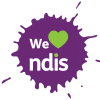Getting accepted as an NDIS participant is the first milestone to accessing potentially life changing support offered by the National Disability Insurance Scheme (or NDIS). The second milestone would have to be learning and becoming fluent in NDIS-speak; the list of everchanging list of jargon used by people in the NDIS world.
Learning NDISspeak makes understanding how to get the most out the NDIS more achievable, because the more participants and families understand how the NDIS works, the better we can use our voice to speak up and share what support we need and know who to ask to get it.
To make understanding the NDIS simpler I have included a list of commonly used words and statements below.
The last statement is a real head scratcher, even the NDIS can’t give a consistent answer!

NDIS Roles
Plan Manager
An NDIS Plan Manager pays invoices sent to them by providers for things you pay for out of your NDIS plan. In other words, a Plan Manager helps by paying for reasonable and necessary supports that have been funded in your NDIS plan. This is only if your plan is plan managed
Local Area Coordinators (LACs – pronounced L. A. C.s)
LACs are local organisations working in partnership with the NDIA. They help participants, their families and carers access the NDIS. In addition LACs will help participants write and manage their plans and also connect participants to mainstream services and local and community-based supports.
Support Coordinator ( AKA COS, which stands for Coordination of Supports)
A Support Coordinator connects participants with an NDIS plan to supports and services in the community. They can also teach you how to access the NDIS portal so you can monitor how your funds are being spent. They monitor the progress and outcomes of achieving your goals and help prepare for plan reviews.
Recovery Coach
Recovery Coaches work with participants that have a Psychosocial disability. However, their role is not about curing or making mental health issues go away, but working towards, and maintain optimal mental health. That looks different for everyone.
Carer
A Carer is Someone who provides personal care, support and help to a person with a disability. This is not a paid or voluntary worker. This could be a family member, friend or guardian.
Support Worker
The definition of a support worker is someone who is paid to look after the well-being of vulnerable people. They help people to live their lives as independently as possible and support them in reaching their potential, they do this by helping with both practical and emotional support.
Planner/ NDIS Delegate
The NDIA Planner gets information from the participant, LAC and Support Coordinator to decide what funding goes into someones NDIS plan. He does this by looking at reports and where relevant information from family and other informal supports. He uses this information to justify what supports and services will assist the participant to achieve their goals. … The NDIS will only fund ‘reasonable and necessary‘ supports for participants to achieve their goals.
Participant
A person who meets the NDIS access requirements.
Provider
A Provider is someone who has products or services to help participants achieve the goals in their plan. Participants can choose their providers and change providers at any time, this is also known as choice and control.
Glossary of NDIS Words
NDIA
National Disability Insurance Agency. The Commonwealth government organisation administering the NDIS.
NDIS
National Disability Insurance Scheme. It is a new way of providing support for Australians with disability, their families and carers. It Is run by the NDIA
NDIS Quality and Safeguards Commission
The NDIS Quality and Safeguards Commission (NDIS Commission) is a new independent Commonwealth agency. It watches over what happens in the NDIS space. It’s job is to improve the quality and safety of NDIS supports and services. They Investigate complaints relating to the NDIS.
Choice and control
A participant has the right to make their own decisions about what is important to them and to decide how they would like to receive their supports and who from.
Mainstream services
The government systems providing services to the Australian public e.g. health, mental health, education, justice, housing, child protection and employment services.
Informal supports
The supports participants get from the people around them, for example family, friends, neighbours.
Service Agreement
A contract between the participant and the service provider they have chosen to deliver the supports in their participant plan.
NDIS Act
The legislation relating to the NDIS. This Is the rule book that relates to the NDIS. It can be accessed here
Think your NDIS plan hasn't got enough funding?
You can ask for a :
Internal Review/ Review of a Reviewable decision (Also known as an S100)
An S100 Is a review that can be asked for when you believe the NDIS has made a mistake relating to a decision. This could be In regards to funding something In a plan or accessing the NDIS. Usually an S100 Is used If you believe the person that made the decision didn’t understand or look at evidence you provided. It is also used if you think they didn’t follow the rules set out In the NDIS Act.
Change of Circumstances Review (Also known as an S48)
An S48 Is a review that can be asked for when you have new evidence or new circumstances that affects how a participant uses their plan. This is to trigger a plan review so that more funding can be requested to help with what has happened, or is going to happen. An example could be moving house, having a significant change In your disability needs or starting a new job.
Reasonable and Necessary Support
The term, often listed as R and N in shorthand is the pillar on which the NDIS rests it’s justification of funding support on. However it is a term that is VERRY open to interpretation.
This term is the equivalent of the question; “how long is a piece of string”.
The NDIS funds a range of supports and services which may include education, employment, social participation, independence, living arrangements and health and wellbeing.
In order to be considered reasonable and necessary, a support or service:
- must be related to a participant’s disability
- must not include day-to-day living costs not related to your disability support needs, such as groceries
- should represent value for money
- must be likely to be effective and work for the participant, and
- should take into account support given to you by other government services, your family, carers, networks and the community.


